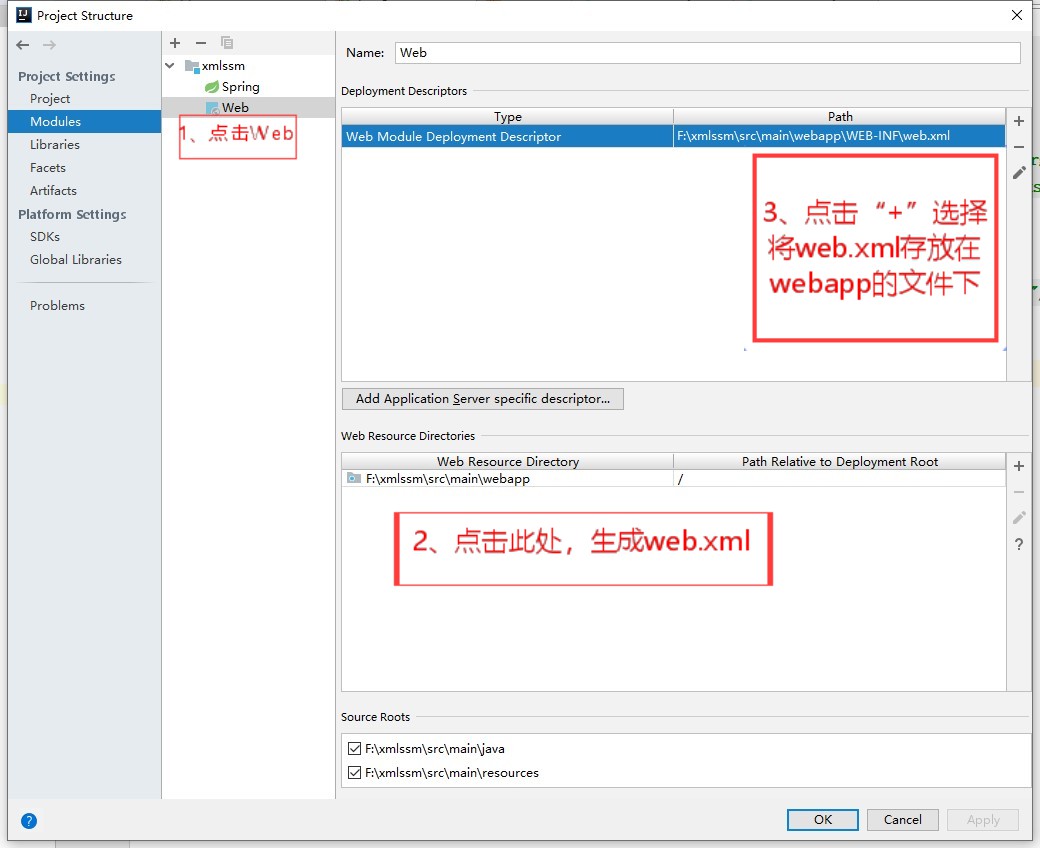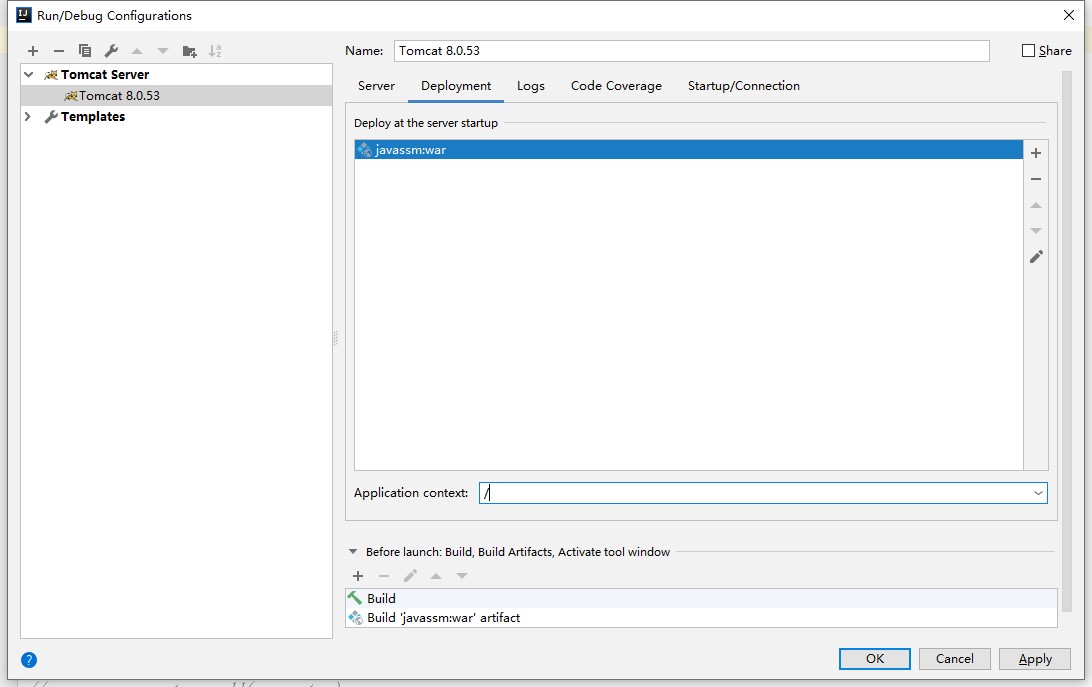spring boot xml配置搭建 ssm 小案例(IDEA)
1、创建Maven工程,在pom.xml文件上添加<packaging>war</packaging> 并且添加 spring-webmvc 的依赖
<?xml version="1.0" encoding="UTF-8"?> <project xmlns="http://maven.apache.org/POM/4.0.0" xmlns:xsi="http://www.w3.org/2001/XMLSchema-instance" xsi:schemaLocation="http://maven.apache.org/POM/4.0.0 http://maven.apache.org/xsd/maven-4.0.0.xsd"> <modelVersion>4.0.0</modelVersion> <groupId>org.javaboy</groupId> <artifactId>xmlssm</artifactId> <version>1.0-SNAPSHOT</version> <packaging>war</packaging> <dependencies> <dependency> <groupId>org.springframework</groupId> <artifactId>spring-webmvc</artifactId> <version>5.1.6.RELEASE</version> </dependency> </dependencies> </project>
2、在resources文件下创建两个 .xml 配置文件,一个是对应 spring 的配置文件 applicationContext.xml ,另一个是对应 springmvc 的配置文件 spring-servlet.xml ;
applicationContext.xml 配置文件中要配置开启包扫描,开启过滤器,但开启的包扫描设置成不扫描controller层;
<?xml version="1.0" encoding="UTF-8"?> <beans xmlns="http://www.springframework.org/schema/beans" xmlns:xsi="http://www.w3.org/2001/XMLSchema-instance" xmlns:context="http://www.springframework.org/schema/context" xsi:schemaLocation="http://www.springframework.org/schema/beans http://www.springframework.org/schema/beans/spring-beans.xsd http://www.springframework.org/schema/context http://www.springframework.org/schema/context/spring-context.xsd"> <!--Spring容器开启扫描,开启拦截器,扫描除了controller层以外的东西--> <context:component-scan base-package="org.javaboy" use-default-filters="true"> <context:exclude-filter type="annotation" expression="org.springframework.stereotype.Controller"/> </context:component-scan> </beans>
spring-servlet.xml 配置文件中要配置开启包扫描,不开启过滤器,但开启的包扫描只扫描controller层,并开启注解扫描;
<?xml version="1.0" encoding="UTF-8"?> <beans xmlns="http://www.springframework.org/schema/beans" xmlns:xsi="http://www.w3.org/2001/XMLSchema-instance" xmlns:context="http://www.springframework.org/schema/context" xmlns:mvc="http://www.springframework.org/schema/mvc" xsi:schemaLocation="http://www.springframework.org/schema/beans http://www.springframework.org/schema/beans/spring-beans.xsd http://www.springframework.org/schema/context http://www.springframework.org/schema/context/spring-context.xsd http://www.springframework.org/schema/mvc http://www.springframework.org/schema/mvc/spring-mvc.xsd"> <!--springMVC开启扫描,只扫描controller层,不开启拦截器--> <context:component-scan base-package="org.javaboy" use-default-filters="false"> <context:include-filter type="annotation" expression="org.springframework.stereotype.Controller"/> </context:component-scan> <!--开启注解扫描--> <mvc:annotation-driven/> </beans>
3、构建web.xml

4、在 web.xml 中配置Filter、Listener、Servlet等
<?xml version="1.0" encoding="UTF-8"?> <web-app xmlns="http://xmlns.jcp.org/xml/ns/javaee" xmlns:xsi="http://www.w3.org/2001/XMLSchema-instance" xsi:schemaLocation="http://xmlns.jcp.org/xml/ns/javaee http://xmlns.jcp.org/xml/ns/javaee/web-app_4_0.xsd" version="4.0"> <context-param> <param-name>contextConfigLocation</param-name> <param-value>classpath:applicationContext.xml</param-value> </context-param> <listener> <listener-class>org.springframework.web.context.ContextLoaderListener</listener-class> </listener> <servlet> <servlet-name>springmvc</servlet-name> <servlet-class>org.springframework.web.servlet.DispatcherServlet</servlet-class> <init-param> <param-name>contextConfigLocation</param-name> <param-value>classpath:spring-servlet.xml</param-value> </init-param> </servlet> <servlet-mapping> <servlet-name>springmvc</servlet-name> <url-pattern>/</url-pattern> </servlet-mapping> </web-app>
5、创建controller
@RestController public class HelloController { @Autowired HelloService helloService; @GetMapping(value = "/hello",produces = "text/html;charset=utf-8") public String hello(){ return helloService.hello(); } }
6、创建service
@Service public class HelloService { public String hello() { return "爪洼男孩"; } }
7、配置tomcat


第一次配置时,需要选择图2中的 Configure... 选择 Tomcat 安装的位置
点击 Deployment 然后再点击右边的 “+” 然后再点击第一个,选择 war,最后OK

启动tomcat,访问http://localhost:8080/hello
此文章是通过个人搬砖汇总所得,用于个人复习。如有错误,麻烦指出,谢谢!



 浙公网安备 33010602011771号
浙公网安备 33010602011771号